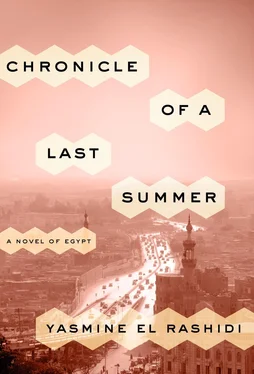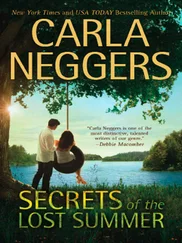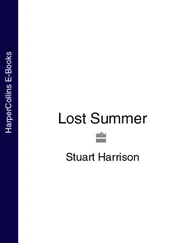Dido turns to the TV. They are showing pictures from inside a museum. The camera shows two glass cabinets. Opera music plays. One display has fields, mud huts, donkeys, men in galabias, women with big dishes on their heads, children playing in the canal. The other has roads and nice buildings and a red bus and men dressed like Baba. The camera zooms close to the writing on the displays. What does it say? I can’t read so quickly. He reads. Before the revolution. And —he unzips his jeans— after the revolution. I watch him. He gets up and starts to pull them down. He says the house feels like a furnace. He doesn’t remember it being so hot. I stare at him from the side of my eye. He is wearing shorts underneath. Blue ones with pink stripes. I turn my head and look. There is a man outside the school who also unzips his trousers but he has nothing underneath, I say. When did this happen? He is there on many days. Have I told Mama? I shake my head. Why? I am scared she will get angry. He tells me I shouldn’t tell anyone and that it’s very bad. He will take care of it. I also saw something else. I saw my girl cousin kissing another girl on the mouth. Is it bad? He tells me it’s not a secret but I should never talk about it to anyone. I nod. Why do they always play the film about the war on Fridays? Because everyone is watching TV waiting for the football match. They want people to remember and to forget. What do they want us to remember? How we won in 1973. What did we win? We crossed the Suez Canal and won back the Sinai from Israel. What do they want us to forget? About 1967. I already know about the Naksa. It was the war Baba wanted to fight in. He thought we were winning but then he looked up at the sky and knew. What did he know? That we had lost. That the president had lied. Why did the president lie? To protect us. When I asked him how he knew we had lost, he said the Israeli planes were flying right over his head. How did he know they were Israeli? The blue star. Baba said that day changed everything.
—
Every Saturday the two men would come to the house. They would ring the bell twice. The first time they came Mama was still asleep. I looked out of the window. They were wearing safari suits. The kind the president wears when he opens factories. They had papers in their hands. When they saw me they called me little girl and asked for Baba. He hasn’t come back. Mama? She is still sleeping. Can you come down and take these papers? I’m not allowed. I put my head back in and closed the window. I went inside and spied on them from the bathroom. They stood at the gate for a long time. When Mama woke I told her. She shouted and said I should never open the window by the door again. She picked up the phone and dialed a number. She spoke French. I stood at the corner of the doorway watching. She talked for a long time then put the phone down loudly. Get dressed, she said, and went into her bedroom. Her red silk robe was open and the sash fell to the floor. I rushed to pick it up. She closed her door. I stood with it in my hand and waited. There was no sound from her room. After a while I rolled it and put it on the floor. I moved it to the right to make sure Mama would see it when she came out. I went to my room and looked out of the window. The street was empty but I could hear the street sweeper. He had a straw broom and you could hear him on weekends and in the middle of the night. I changed out of my pajamas into red trousers and a white T-shirt. I put on white socks and my favorite blue shoes. I had three pairs of shoes. I went back outside and sat on the sofa. I waited with my hands on my lap.
Time passed slowly then the doorbell rang again. Mama came out. Go to your room . She had a visitor. I went. My room used to be Mama’s room until she turned sixteen. After that they gave her a bigger one. It used to be blue, but Mama let me change it. I chose mustard. It was a strange choice for a young girl, Mama said. The color was different now. Darker. I wanted to change it again but Mama said I had made my choice and that it was a fact of life, things get darker . I stared at her.
I lie on the floor and stick my head under the bed. I open one of the hidden albums. The pictures are black and white but I imagine them in color. The first is of Granny at the door of the house. Her fur is slipping off her shoulders. She is standing with three women looking at the camera. Someone is kissing her. Here is Granny with her English friends. And the woman with the big pearls. Her lips look black in the picture but I know they are red. In this one, Granny is surrounded by people. Everyone is listening to her. They are frowning like Mama tells me not to. This picture, my favorite, at the dining table. Everyone is laughing. Granny is talking to them with her hands in the air. Some pictures but not many have Grandpa. He is wearing a tarboosh. In one of the pictures it is colored red. In another picture his eyes are colored green. Mama tells me that she took Grandpa’s eyes. They contained in them secrets like the sea. My eyes are different. They are dark like Baba’s and you can’t see into them. There are six pictures of me. Square ones with a white border. Three of them are from the same day. In one picture Baba is carrying me on his arm. I am holding my bear, Fluffy. In another Mama has me on her lap. Then Aunty is carrying me with both arms. These pictures are colored. I’m wearing green pajamas. Baba, Mama, and Aunty are all in black. We are in the garden. Aunty has on dark glasses. I asked Baba once to tell me what happened that day. It was the day Uncle Hussein died. He was Mama’s brother-in-law. They had just come back from burying him and were in the garden. Baba said he remembered the day like it was yesterday. It was the day Sadat made peace with Israel. He wished Uncle had lived to see.
After they killed Sadat, Baba stopped talking to his uncle, Ashraf, for a whole year because Uncle’s son was one of the killers. Baba said it was Uncle’s fault for not paying close enough attention. I heard him say that if he hadn’t spent all his time with a glass in his hand things might have been different. But nobody spends all their time with a glass in their hand. How would they sleep? I was scared Uncle Ashraf might be a killer too. Baba said I shouldn’t be silly. It was just a trend with young people who were lost. They turned to religion. When he wanted to fight in the war was he one of them? He laughed and said they were different things. Baba’s cousin was still in prison for killing Sadat. He would be there for the rest of his life. It was a different prison from the one we went to when we saw Mama’s thief. Nobody could go to this prison. They did terrible things to people there. More terrible than we could imagine. They tried to break people’s souls. Baba said sometimes there was little difference between the living and the dead. His cousin might as well have been dead.
I stand in front of my mirror. I pretend I have flowers in my hair. I smile and twirl around. I’m in a field, on a hill. I open my mouth and sing without sound. There is a small picture of Mama when she was a girl on the mirror. I also have a picture of Baba carrying me. Grandmama says my relationship with Baba is special and no matter what, I should know that he loves me. She said Baba’s situation is very common and many people were going through the same thing. I hear a loud sound. I open the window and stick my head out. There’s a truck at the corner. Men next to it are planting yellow flowers around one of the trees on the side of the road. Others are painting the pavement. One is painting black. One white. They move forward, slowly. I watch. Paint. Plant. Plant. Paint. They are the only people on the street. It’s Saturday. Nobody goes out on Saturday in the summer until the sun goes down. The streets are quiet, then at prayer the men come out. They walk to the mosque. When the prayer finishes the women and children come out too. It is cooler by then. Many people go to the club. The club also used to belong to the king. Then Nasser came and gave half of it to the people. He made it free. Half the fields and half the horse-racing track and half the golf course. The other half is for other kinds of people, like us. We have to pay. In the summer when we came back from Alexandria we would sit at the club with Baba under the eucalyptus trees and order a jug of lemonade.
Читать дальше

![Маргарет Миллар - Rose's Last Summer [= The Lively Corpse]](/books/384369/margaret-millar-rose-s-last-summer-the-lively-c-thumb.webp)










